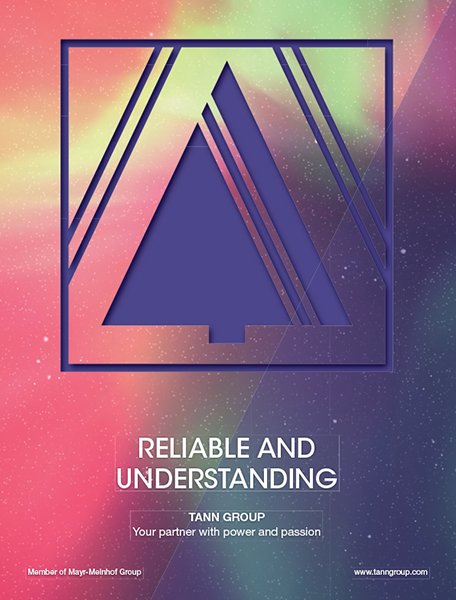Being You
- Print Edition Sustainability
- February 1, 2021
- 0
- 1
- 8 minutes read


How each of us plays a crucial role on the journey to achieving sustainable and inclusive workforce change
By Rene Staebe
Have you ever felt the need to put on a “persona” for work?
In a corporate world where individuality is embraced, it is extraordinary that some of us still feel we can’t bring our whole selves to work.
It makes sense that feeling at ease to be yourself brings out the best in you, and there is plenty of research backing up the theory that happy, motivated employees perform better. So why is it that some of us still feel we can’t be authentic in a professional environment? And how can we shed the stigma that makes us feel the need to put on an act?
For many of us—including women, LGBT+ community members and people of color—the answers to these questions can be traced to our industry’s long history of having a predominantly heterosexual, cisgender, white, male-dominated workforce. Thankfully, businesses now widely acknowledge that there is not only an ethical need to break this mold but also that there are many significant benefits to a diverse workforce wherein different personalities and perspectives bring new ideas to the table. Talent stays longer because they enjoy collaborating with diverse and open-minded colleagues, and the employee population more honestly resembles its consumer base.
There is no doubt that a diverse workforce and an inclusive business culture drive business performance. The greatest challenge is achieving it.
I was recently invited to participate in the 2020 Global Tobacco and Nicotine Forum’s diversity and inclusion panel. Ironically and perhaps amusingly, I was the token “white male” on the panel, albeit representing the LGBT+ PRIDE community. The discussion raised many concerns, the biggest being the slow progress in achieving genuine diversity in the workplace, and several insightful solutions were presented. The resounding conclusion was that we still have a way to go and that employees are key to achieving sustainable change. This echoes my long-held belief that driving positive, sustainable change in any industry requires striking a balance between the corporate-led diversity and inclusion push and employees feeling empowered to be the agents of change.

Building a place of belonging
Change takes time and is usually uncomfortable. However, if you believe in it and feel you are a part of it, then the journey feels less onerous.
Japan Tobacco International (JTI) is still in the early stages of its change journey, but in the three years that I’ve been with the company, I have witnessed great progress. Our leadership is engaged, and the support I feel across the company has given me a strong sense of purpose and hope.
We have an ambitious diversity and inclusion vice president, Christiane Bisanzio, who with the help of a dynamic team is driving a bold strategy that focuses on five strategic pillars—gender equality, N-WOW (new ways of working, i.e., creating a more modern and flexible working environment), LGBT+ inclusion, well-being and my generation (with a particular focus on millennials). Our corporate mantra “everyone counts,” although not developed specifically to promote diversity and inclusion, resonates widely across the organization and feels highly appropriate.
It is worth pointing out that I personally have always had the privilege of feeling comfortable being my true self at work. Prior to joining JTI, I worked at Procter & Gamble where inclusion is a part of the company DNA. So, when I adopted a new corporate culture, I carried this well-established and ingrained self-confidence with me. However, I have always been aware that not everyone has had such a positive experience and many still face barriers today.
I recognize now how the presence of role models is a powerful element of inclusion. Having peers around you that you can relate to makes it so much easier to be authentic. Consequently, this has become one of my “personal raison d’etre.” As one of the loud and proud queer voices at JTI, if I can help just one person feel more confident to be their true self in the workplace, then my efforts will have been worthwhile.

Employee-led change
None of us can make change happen singlehandedly. Achieving successful and sustainable changes requires advocacy and an environment in which people feel safe and empowered to speak up and know they’ll be heard.
At JTI, we are still collectively figuring out the best approach to diversity and inclusion and shifting our corporate culture, and in some cases, we still have to explain the value and benefits of an effective agenda. Every initiative that resonates with employees and helps shift the status quo is exciting progress, which makes my role as a vocal champion even more relevant and important. JTI genuinely is an energizing place to be right now.
We’ve had particular success at encouraging dialogue through employee resource groups (ERGs), most of which are being driven from our headquarters in Geneva. These voluntary, employee-led forums bring underrepresented communities together to support one another, raise concerns and share ideas for driving awareness and inclusiveness. JTI leadership has actively embraced them, recognizing their value to meet and hear the voices of underrepresented employee groups and as a useful sounding board when developing policies and corporate strategy. Our CEO Eddy Pirard has joined us at a PRIDE virtual happy hour, and our Corporate Affairs and Communications Senior Vice President Suzanne Wise has been reluctant to take off her JTI PRIDE t-shirt.
Thanks to this empathetic leadership and a loyal and growing team of allies, colleagues are more comfortable speaking up and sharing their stories than they were previously. The mounting enthusiasm for ERGs such as PRIDE is contagious. I am hopeful we’ll see conversations about LGBT+ and other diversity and inclusion topics, such as gender, race and generation diversity, germinate as employees feel empowered to speak up about diversity topics that resonate with them in their market.
With the bottom-up push from employees gaining strength, we are ripe to embrace a corporate-led pull from the top of the company. Leadership-endorsed policy changes are already giving us the momentum and motivation to make genuine and sustainable progress in our five key diversity and inclusion pillars.
I’ve always said, great minds don’t always think alike. At JTI, we are taking the first steps to disrupting a long-worn uniformity, and we are doing so by ensuring employees play a key part in the conversation.
There is no doubt that greater representation of previously unseen groups, and a more open and inclusive culture where everyone feels comfortable being themselves, will better prepare us for the future—a future where our employee base truly reflects the world in which we are operating.
Rene Staebe is a corporate communications manager at JTI.
